 Petzlover
Petzlover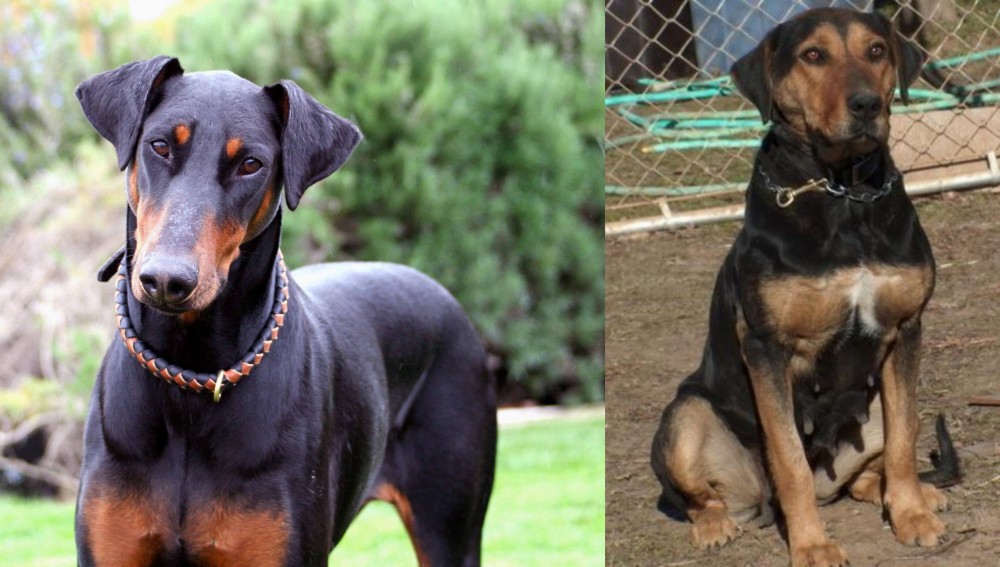 Doberman Pinscher is originated from Germany but New Zealand Huntaway is originated from New Zealand. Doberman Pinscher may grow 12 cm / 5 inches higher than New Zealand Huntaway. Both Doberman Pinscher and New Zealand Huntaway are having almost same weight. Doberman Pinscher may live 3 years less than New Zealand Huntaway. Doberman Pinscher may have more litter size than New Zealand Huntaway. Doberman Pinscher requires Low Maintenance. But New Zealand Huntaway requires Moderate Maintenance
Doberman Pinscher is originated from Germany but New Zealand Huntaway is originated from New Zealand. Doberman Pinscher may grow 12 cm / 5 inches higher than New Zealand Huntaway. Both Doberman Pinscher and New Zealand Huntaway are having almost same weight. Doberman Pinscher may live 3 years less than New Zealand Huntaway. Doberman Pinscher may have more litter size than New Zealand Huntaway. Doberman Pinscher requires Low Maintenance. But New Zealand Huntaway requires Moderate Maintenance
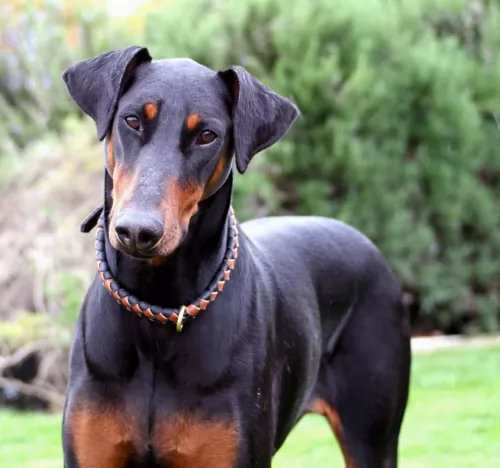 The origin of Doberman is Apolda, in Germany in 1890. It was officially recognized as a breed in 1900. The name originally called as Thuringer pinscher or Plizeilichi and the peer was renamed as DOBERMAN PINSCHER in 1899.American Kennel Club recognized DOBERMAN PINSCHER in 1908. The German tax collector called Karl friedrich developed Doberman.
The origin of Doberman is Apolda, in Germany in 1890. It was officially recognized as a breed in 1900. The name originally called as Thuringer pinscher or Plizeilichi and the peer was renamed as DOBERMAN PINSCHER in 1899.American Kennel Club recognized DOBERMAN PINSCHER in 1908. The German tax collector called Karl friedrich developed Doberman.
He developed a breed that would be able to protect him from his surroundings and from his neighborhoods. This Dober also ran as a local animal shelter and approch many dogs for his breeding program. But karl did not kept any proper records or document for this breeds origin. Dobeis are also found through United States, Russia and South Africa.
 The New Zealand Huntaway was developed in New Zealand. The dog was brought about by mixing the Border Collie with a number of other breeds, of which the Doberman Pinscher is one.
The New Zealand Huntaway was developed in New Zealand. The dog was brought about by mixing the Border Collie with a number of other breeds, of which the Doberman Pinscher is one.
The idea was to have a skilled herding dog for livestock, and the Huntaway is known for its loud bark which it uses to herd.
The dog is looked upon as as a fairly new breed, dating from the late 19th century. These days it is a popular companion dog, and in 2013 was recognized by the New Zealand Kennel Club.
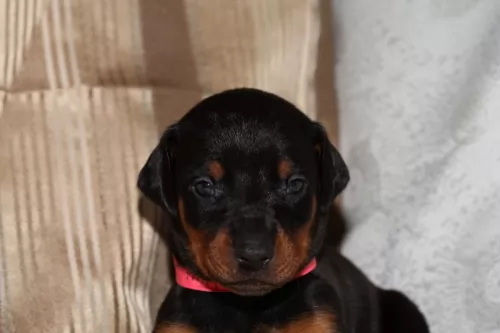 Dobermans are certainly shorthaired mixed –breed shepherd dogs, this kind of dogs are chosen only for their intelligent, sound and endure. This breed is best in attitude and appearance, and now it is found in world wide. Dobermans are highly intelligent and fast runners. So mostly dobers are only suited for Police, Army and Guard works. Dobies are also used as guide dogs for the blind.
Dobermans are certainly shorthaired mixed –breed shepherd dogs, this kind of dogs are chosen only for their intelligent, sound and endure. This breed is best in attitude and appearance, and now it is found in world wide. Dobermans are highly intelligent and fast runners. So mostly dobers are only suited for Police, Army and Guard works. Dobies are also used as guide dogs for the blind.
They are very elegant in appearance. Dobies are watchful, determined, energetic, fearless, obedient, alert and loyal. Dobies are short coat so it is easy for care. Brushing regularly can avoid shedding at home. They have almond shaped eyes, they have long narrow heads. The Doberman ears are often cropped but many of the owners like dobers by their nature. Dobers looking was always like a graceful giant.
 As a deep chested, medium to large sized dog, the New Zealand Huntaway stands at between 50 and 60cm and weighs roughly 25 to 40kg.
As a deep chested, medium to large sized dog, the New Zealand Huntaway stands at between 50 and 60cm and weighs roughly 25 to 40kg.
The eyes are soft and kind. The coat is usually black and tan colored, although it can be brindle too. The coat is in different textures and can be mostly smooth, but also fairly rough textured. The ears are usually medium length and floppy, the legs straight and long and the tail is long.
These dogs are good natured and are guaranteed to make a splendid family pet. Because they have always been used to life in the country, they are more suited to this lifestyle than for living in the city.
They are friendly, energetic dogs and will require a good deal of exercise.They don’t take easily to lying around bored and this lifestyle will just lead to frustration and destructive behavior, through no fault of their own.
Just like with any other dog, the New Zealand Huntaway will need to be trained and socialized so that he becomes obedient and well rounded. This is necessary for him as he is an independent canine with a determined streak.
His intelligence will mean he is able to learn easily. He also is gentle and kind-hearted, and gets on well with kids and pets in the home.
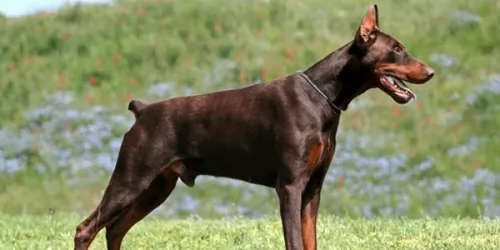 Dobermans are individual in personalities. Some dogs are friendly and outgoing; some Dobies are reserved and shy. Some will be more dominant with other dogs it used to chase small dogs and cats. Most of the dobers are soft in character and love companionship with people.
Dobermans are individual in personalities. Some dogs are friendly and outgoing; some Dobies are reserved and shy. Some will be more dominant with other dogs it used to chase small dogs and cats. Most of the dobers are soft in character and love companionship with people.
Dobers have high energy level and it requires a lot of exercise in order to avoid harmful behavior to others. We should keep them interested because intelligent dogs are easily got bored. They mostly enjoys only in outing because they will be happy with the people who walks, runs and in bike riding.
When learning new things they are the best. Dobermans are not able to be a lazy. For many years dobers are the only dogs being excellent as police dogs. Because they are highly active in nature so they are interested in new this for learning.
Dobers are apartment adaptable dogs. They used to bark but are close and friendly to people. At the same time we have to train dobers to welcome the guest also.
 The Huntaway has got so much going for him to make him a splendid family pet. Not only is he intelligent, but he is evenly balanced, friendly, social and active.
The Huntaway has got so much going for him to make him a splendid family pet. Not only is he intelligent, but he is evenly balanced, friendly, social and active.
He can easily be trained and socialized. He is friendly and gentle with other pets in the home as well as with children. With a firm, fair, kind, patient and consistent owner in his life, this dog with the gentle brown eyes will be a fantastic pet for you.
 The Huntaway is the kind of dog that won’t require you having to rush off to the vet with him. Good care with nutritious food and exercise can see him reaching 14 years of age or so.
The Huntaway is the kind of dog that won’t require you having to rush off to the vet with him. Good care with nutritious food and exercise can see him reaching 14 years of age or so.
Some common dog illnesses to look out for include -
This disease is about degeneration of the heart muscle with the muscle becoming thinner. The pressure of the blood inside the heart causes these thin walls to stretch, resulting in the heart becoming enlarged.
Although heart disease develops slowly, severe congestive heart failure can develop quickly and you may notice rapid breathing and a blue tongue. It is imperative to get your pet to the vet immediately.
Small studies have revealed that the rate of Dilated Caridomyopathy could be higher in Huntaways.
This is an issue where the hips haven’t formed properly. Affected dogs lose their mobility and battle with pain and lameness. Certainly you will need to get your pet to the vet to make sure that he is pain-free and comfortable.
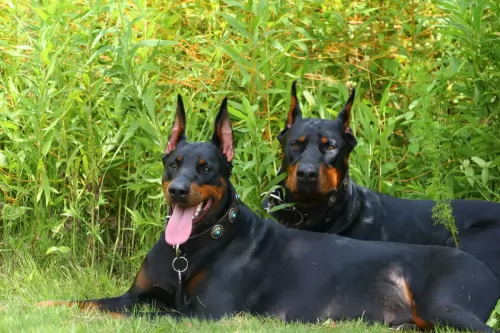 Dobers are mostly come in black, blue, red or fawn. Dobers are low maintenance for grooming. They were clean dogs because they never make a strong dog odor. Using brush in dobers hair for once per week reduces hair fall control. Dobers are not requiring frequent bathing most of the owners are getting bath for 3 or 4 times per year in grooming.
Dobers are mostly come in black, blue, red or fawn. Dobers are low maintenance for grooming. They were clean dogs because they never make a strong dog odor. Using brush in dobers hair for once per week reduces hair fall control. Dobers are not requiring frequent bathing most of the owners are getting bath for 3 or 4 times per year in grooming.
You can feed your puppy 2-3 small meals per day until it was 4 months old. And then have to decrease one meal and two for a day. And often you should not keep food and leave food sitting out all the time. Then after six months needs to stop feeding much vitamins and minerals because it leads a several health problems in his muscle and joints.
This type of dogs should not be tied up alone outside, because it should be manifest itself by barking chewing. The people who are working for a long time should not be adopting this type of dogs. Naturally dobers are well protective to our home and people. At the same time small children must be supervised. At the same time if we are not strict, dobers would be get out of our hand.
 This dog is an average shedder and fairly low maintenance, requiring you to brush him twice a week to keep the coat shiny and free from loose hairs.
This dog is an average shedder and fairly low maintenance, requiring you to brush him twice a week to keep the coat shiny and free from loose hairs.
Dogs that have floppy- or folded ears need to have their ears checked for infection as well as their eyes. They also need to have the nails trimmed as left long, they can hook onto things which can rip into the dog’s flesh.
The Huntaway is a herding dog, and even though your dog today is more of a companion dog, he will need to be fed a high-quality commercial dog food which has been particularly formulated for active working dog breeds.
It is a good idea to sometimes break away from a bowl of kibble and to mix in some homemade food. The simpler the better for your dog, and boiled chicken, some brown rice or pasta and some vegetables such as sweet potato, carrots and spinach mixed into his kibble occasionally will do him the world of good.
Now and then you can also add in some raw meat if possible. Avoid exotic, spicy foods with your pet to avoid digestive problems.
This dog has always been a hunting, herding dog so it is going to require a lot of exercise to keep him content and happy.
He won’t only need physical exercise but will also need mental stimulation as he is an intelligent dog too. Apart from taking him for walks and giving him ball- and rope games, for mental stimulation, why not consider some food puzzle toys?
These are sturdy containers that hold dog food and treats inside. Dogs have to paw at it, lick, shake and think up ways to get at the tasty treat. These food puzzle toys will keep your pet occupied for a while and keep him happily thinking.